Bill Ethridge
Part I: The Road to Bavaria
Part II: Stalag VII A Moosburg
Source:
Bill Ethridge: Time Out. A Remembrance of World War II. 1998, p. 137-143.
Reproduction kindly permitted.
|
Moosburg
April 21 - May 8, 1945
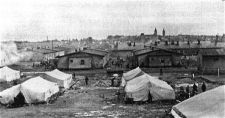 The camp was a mess. As far as we could see throughout the camp there was nothing but mud and hundreds and hundreds of prisoners. The first order of business was to register. Record-keeping was a fetish with our hosts. All of our names and prior camps had to be listed and verified. This took hours but finally our combine was cleared and we were escorted by a guard to a large tent. The tent had seen better days as was obvious from the many holes in the top and sides. All bunks were taken but we found enough space on the floor to accommodate six men and their baggage. It was past the evening meal so we ate from our packs and with the help of a few friendly souls found a pot of coffee.
The camp was a mess. As far as we could see throughout the camp there was nothing but mud and hundreds and hundreds of prisoners. The first order of business was to register. Record-keeping was a fetish with our hosts. All of our names and prior camps had to be listed and verified. This took hours but finally our combine was cleared and we were escorted by a guard to a large tent. The tent had seen better days as was obvious from the many holes in the top and sides. All bunks were taken but we found enough space on the floor to accommodate six men and their baggage. It was past the evening meal so we ate from our packs and with the help of a few friendly souls found a pot of coffee.
 I was seated against the wall in preparation for sleeping when I heard my name being called by two familiar voices, Mateyka and McCall! They had been checking the recently arrived prisoners and had just spotted Sobolof and me. We were happy not only to be reunited but most importantly to know that the four of us were okay. They had arrived in Moosburg about two weeks earlier and agreed that this Stalag was worse than any they had seen, both from the standpoint of being overcrowded and dirty. We talked briefly about places we had stayed during the past month. None of us had any idea of the whereabouts of our enlisted crew. An older prisoner came to our combine and announced that he had seen us enter the tent and wondered if we were new arrivals. I told him that we had come into camp today with the contingent from Nurnberg. He introduced himself as Captain Somebody, saying that he was the senior American officer in this tent. He then handed us a pail of hot soup he had obtained from the central kitchen. We accepted his word and enjoyed the soup. An April shower passed over during the night, some of it entering the tent through the holes we observed earlier. The next day Sobolof and I were assigned to one of the standard German Army barracks.
I was seated against the wall in preparation for sleeping when I heard my name being called by two familiar voices, Mateyka and McCall! They had been checking the recently arrived prisoners and had just spotted Sobolof and me. We were happy not only to be reunited but most importantly to know that the four of us were okay. They had arrived in Moosburg about two weeks earlier and agreed that this Stalag was worse than any they had seen, both from the standpoint of being overcrowded and dirty. We talked briefly about places we had stayed during the past month. None of us had any idea of the whereabouts of our enlisted crew. An older prisoner came to our combine and announced that he had seen us enter the tent and wondered if we were new arrivals. I told him that we had come into camp today with the contingent from Nurnberg. He introduced himself as Captain Somebody, saying that he was the senior American officer in this tent. He then handed us a pail of hot soup he had obtained from the central kitchen. We accepted his word and enjoyed the soup. An April shower passed over during the night, some of it entering the tent through the holes we observed earlier. The next day Sobolof and I were assigned to one of the standard German Army barracks.
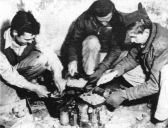 April 22 to 27. This camp is much worse than we had expected. Everything is pretty disorganized and the Germans are arrogant and edgy. There is one centrally located cooking facility operated by prisoners and supervised by a German non-com. They provide hot water for coffee or tea and soup an an irregular schedule. There is no wood available for use by the prisoners in their Small make-shift stoves. To make matters worse, the grounds are ankle-deep in mud despite the fact that it rained only one day this week! We were informed that this had been a swamp at one time and that it was always wet. Further, the mosquitoes breed here by the millions during the summer months. Something great to look forward to. However, we plan to be out of here this month! Our beds are the typical triple bunks with mattresses filled with straw and all of the Same little critters we haue met before. My mattress was mysteriously wavy with what felt like steel rods supporting it about every two feet. I soon discovered the reason. Wood for cooking had been so scarce that someone had shaved the bed slats to obtain kindling, and the original three-inch-wide bed slats were down to about an roch and a half. I was surprised that they had not broken, but it seemed that they were made of a kind of tough hardwood. During the ensuing week I managed to cut these slats down to about one roch and they still held.
April 22 to 27. This camp is much worse than we had expected. Everything is pretty disorganized and the Germans are arrogant and edgy. There is one centrally located cooking facility operated by prisoners and supervised by a German non-com. They provide hot water for coffee or tea and soup an an irregular schedule. There is no wood available for use by the prisoners in their Small make-shift stoves. To make matters worse, the grounds are ankle-deep in mud despite the fact that it rained only one day this week! We were informed that this had been a swamp at one time and that it was always wet. Further, the mosquitoes breed here by the millions during the summer months. Something great to look forward to. However, we plan to be out of here this month! Our beds are the typical triple bunks with mattresses filled with straw and all of the Same little critters we haue met before. My mattress was mysteriously wavy with what felt like steel rods supporting it about every two feet. I soon discovered the reason. Wood for cooking had been so scarce that someone had shaved the bed slats to obtain kindling, and the original three-inch-wide bed slats were down to about an roch and a half. I was surprised that they had not broken, but it seemed that they were made of a kind of tough hardwood. During the ensuing week I managed to cut these slats down to about one roch and they still held.
April 28. We could hear artillery fire in the distance coming from the west and southwest. This is the direction that General Patton is supposedly coming from. I hope! I walked around the camp visiting with Mateyka and McCall in their big tent and talking with several others including two guards. Everybody is on edge, expecting that Patton will take the camp any time. The Germans are also sure of that. Food is secondary today. There is some but not much, a little self made meatless stew and real good week-old bread. There was very little sleeping tonight. We were mentally helping Patton come through. We could hear the artillery getting closer by the minute and the resulting sounds and the vibrations reminded me of a Midwest thunder storm.
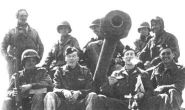 April 29. Daybreak brought the sound of shouting and gunfire at the front gate. From our barracks we could See German troops near that gate, and they were firing in! We were ordered to stay inside as the Germans began fighting each other. We found out later when bodies were being loaded onto a truck that the Gestapo had attempted to take the camp from the Wehrmacht. Little did we know at that time, but Hitler had issued an order to kill all of the prisoners in the camp. The Gestapo and the SS troops attempted to carry out that Order, and the German army had saved our lives. Almost on cue after the fighting stopped, American troops backed by one tank and one Jeep arrived at the front gate. The German army personnel surrendered immediately. The American flag was raised over Moosburg at 1240 hours, and it was a sight that brought tears to many eyes. At 1315, General Patton came through the gate, standing erect in his Jeep behind his driver. Another Jeep followed with four heavily armed soldiers. There, finally, was Old Blood and Guts in Person with those famous pistols an his hips. Tears were rolling down hundreds of faces including mine. The memories and the visions of this day will live with me forever.
April 29. Daybreak brought the sound of shouting and gunfire at the front gate. From our barracks we could See German troops near that gate, and they were firing in! We were ordered to stay inside as the Germans began fighting each other. We found out later when bodies were being loaded onto a truck that the Gestapo had attempted to take the camp from the Wehrmacht. Little did we know at that time, but Hitler had issued an order to kill all of the prisoners in the camp. The Gestapo and the SS troops attempted to carry out that Order, and the German army had saved our lives. Almost on cue after the fighting stopped, American troops backed by one tank and one Jeep arrived at the front gate. The German army personnel surrendered immediately. The American flag was raised over Moosburg at 1240 hours, and it was a sight that brought tears to many eyes. At 1315, General Patton came through the gate, standing erect in his Jeep behind his driver. Another Jeep followed with four heavily armed soldiers. There, finally, was Old Blood and Guts in Person with those famous pistols an his hips. Tears were rolling down hundreds of faces including mine. The memories and the visions of this day will live with me forever.
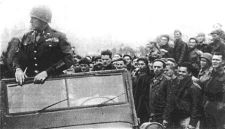 Patton stayed for about a half hour after giving a short speech, adding "we will whip the bastards all the way to Berlin." I was elated when he extended his hand for a shake, something he rarely did. This day of liberation was the anniversary of my graduation from bombardier school and commissioning as a Second Lieutenant, a year during which I also celebrated my 21st birthday.
Patton stayed for about a half hour after giving a short speech, adding "we will whip the bastards all the way to Berlin." I was elated when he extended his hand for a shake, something he rarely did. This day of liberation was the anniversary of my graduation from bombardier school and commissioning as a Second Lieutenant, a year during which I also celebrated my 21st birthday.
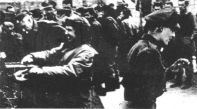 April 30. There has been a steady parade of American Jeeps and Army officers in and out of camp ostensibly for the purpose of organizing our evacuation. We were ordered not to leave the camp and to behave like gentlemen while we were waiting to leave. This was one order almost totally ignored, but made easier bv the stream of food and clothing that continued to arrive. The center of attraction today was two Red Cross girls who arrived about noon with a ton of doughnuts and plenty of good coffee.
April 30. There has been a steady parade of American Jeeps and Army officers in and out of camp ostensibly for the purpose of organizing our evacuation. We were ordered not to leave the camp and to behave like gentlemen while we were waiting to leave. This was one order almost totally ignored, but made easier bv the stream of food and clothing that continued to arrive. The center of attraction today was two Red Cross girls who arrived about noon with a ton of doughnuts and plenty of good coffee.
May 1 to 5. Every day has been a picnic with plenty of food, wood to cook with and bread that tasted like cake. And thank the Good Lord no more barley. Small groups of prisoners are being moved out every day to the airport at Landshut and then flown to Le Havre, France in C-47's, the military version of the Douglas DG3. I am among a group scheduled to leave on the 6th.
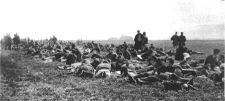 May 6. We are an our way to the airport, where upon arrival we see hundreds of ex-POW's camped an the ground but only one C-47. It seems like we are back in the good old American Army, but no one is really complaining. We are told that we may be here a few days because there were more prisoners than expected and they must arrange for more planes. Fortunately, the weather is good.
May 6. We are an our way to the airport, where upon arrival we see hundreds of ex-POW's camped an the ground but only one C-47. It seems like we are back in the good old American Army, but no one is really complaining. We are told that we may be here a few days because there were more prisoners than expected and they must arrange for more planes. Fortunately, the weather is good.
May 7. We are still at Landshut. I was sitting at the very end of the line with two ex-prisoners I did not know when an American Captain drove up to us in a Jeep. He asked if the three of us would like to accompany him into town. What a dumb question! As we left the airport he announced that we were going to the local brewery to do some liberating. The brewmaster tried to be gracious but it was obvious that we really weren't welcome until the Captain handed him a $10 bill. This brought a smile and another dumb question, "would you like some beer?" We came away with two kegs of very heavenly brew. The Captain left one for us to share, and took the other with him. There is now a happy bunch waiting at the end of the live.
 May 8. The Party is over. We are boarding a plane today and leaving Germany an a happy note!
May 8. The Party is over. We are boarding a plane today and leaving Germany an a happy note!
 Source: Source:
|




 The camp was a mess. As far as we could see throughout the camp there was nothing but mud and hundreds and hundreds of prisoners. The first order of business was to register. Record-keeping was a fetish with our hosts. All of our names and prior camps had to be listed and verified. This took hours but finally our combine was cleared and we were escorted by a guard to a large tent. The tent had seen better days as was obvious from the many holes in the top and sides. All bunks were taken but we found enough space on the floor to accommodate six men and their baggage. It was past the evening meal so we ate from our packs and with the help of a few friendly souls found a pot of coffee.
The camp was a mess. As far as we could see throughout the camp there was nothing but mud and hundreds and hundreds of prisoners. The first order of business was to register. Record-keeping was a fetish with our hosts. All of our names and prior camps had to be listed and verified. This took hours but finally our combine was cleared and we were escorted by a guard to a large tent. The tent had seen better days as was obvious from the many holes in the top and sides. All bunks were taken but we found enough space on the floor to accommodate six men and their baggage. It was past the evening meal so we ate from our packs and with the help of a few friendly souls found a pot of coffee.